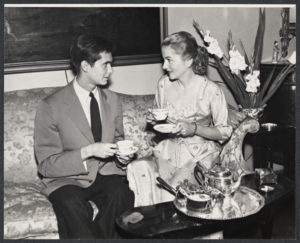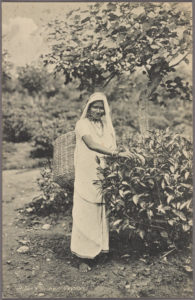Tea

Tea and sympathy. [1953]

A tea plucker, Ceylon
Tea is seen as a product of colonization. Although the characters in the novel are drinking tea happily, behind scenes tea is the suppression for colored people. Specifically in the tea trade. Those colored people are in India. Tea although used as a nice gesture comes at the cost of pain and suffrage. Tea was sought after by the British in which nothing stopped them from attaining. This suffrage includes horrible working conditions in the tea trade.
Although tea has thrived culturally, the plantation workers do not benefit from it. Well Duetsche in “Bitter Cup – The Dark Side of the Tea Trade” states that the plantation workers “live in squalid conditions, with no access to clean drinking water or sanitation. Though they are exposed to highly toxic pesticides at work, they are not equipped with any kind of protective clothing” (Deutsche 3)
Most of the plantation workers are actually children and the pesticide use and poverty is harmful for children but most of the tea’s are falsely advertised by stating ” Fair Trade Certified” . Unfortunately there is nothing fair about this. Duetsche further explains that “Children on the tea plantations are poorly nourished, their growth and development is delayed, and child mortality is high. Ultimately, the pesticides used in tea farming also end up in consumers’ tea cups”( Duetsche 6). Duetsche explains the extremities the children and plantation workers endure and how it affects the kids.
Hamid Dabashi in “How British Colonialism Ruined a Perfect Cup of Tea”explains “After all these criminal atrocities around the world – stealing, pillaging, trading in slaves, mass murdering people to rob them of their natural resources – are you surprised at what the British have ended up with? Drinking that tea is an act of redemptive suffering, a just punishment for what the British have done to the world at large. Every time they sip from that accursed cup they are paying penance for the terror they have visited upon this earth”(Dabashi 5).
Tea is used in the novel to evoke sympathy or to relieve stress in the novel which is seen in the image above. Tea is introduced in the beginning of the novel at the Drayton Hotel when Irene is walking and feels as if she is going to pass out. Tea is the first thing on her mind as she says “its tea I need. On a roof somewhere”(Larsen 179). Tea is used as a point of social gatherings. Clare invites Irene for tea and the admiration of the tea sets are heavily expressed whilst at the tea party Irene hosts. Tea is also aoffered to Irene in order to make her stay longer. In the novel, the effect of tea is to collaborate, to brings things together or to cool them down. This however is not truly the case because the trade shares the ugly truth.
Sources:
Billy Rose Theatre Division, The New York Public Library. “Tea and sympathy. [1953]” The New York Public Library Digital Collections. http://digitalcollections.nypl.org/items/be59cece-fb87-ab10-e040-e00a18060151
Dabashi, Hamid. “How British Colonialism Ruined a Perfect Cup of Tea.” GCC News | Al Jazeera, Al Jazeera, 18 Sept. 2017, www.aljazeera.com/indepth/opinion/british-colonialism-ruined-perfect-cup-tea-170918113331476.html.
Deutsche Welle. “Bitter Cup – The Dark Side of the Tea Trade | DW | 02.07.2018.” DW.COM, www.dw.com/en/bitter-cup-the-dark-side-of-the-tea-trade/av-44495056.
Working conditions on many of India’s tea plantations are disastrous. The pickers live in dire poverty with no clean drinking water and are exposed to pesticides. Why are Indian tea workers not benefiting from the global tea boom?
Deutsche Welle. “Bitter Cup – The Dark Side of the Tea Trade | DW | 02.07.2018.” DW.COM, www.dw.com/en/bitter-cup-the-dark-side-of-the-tea-trade/av-44495056.


